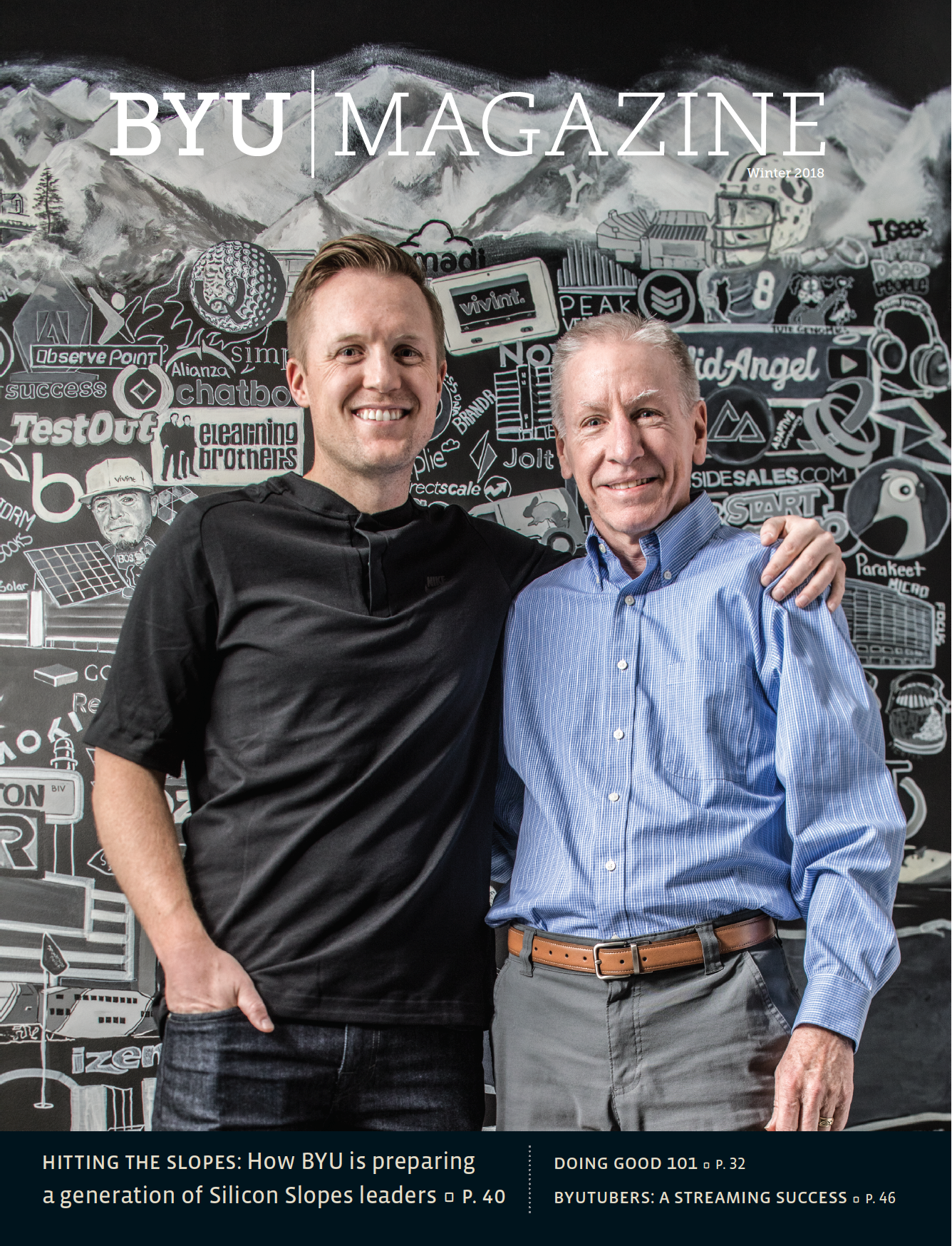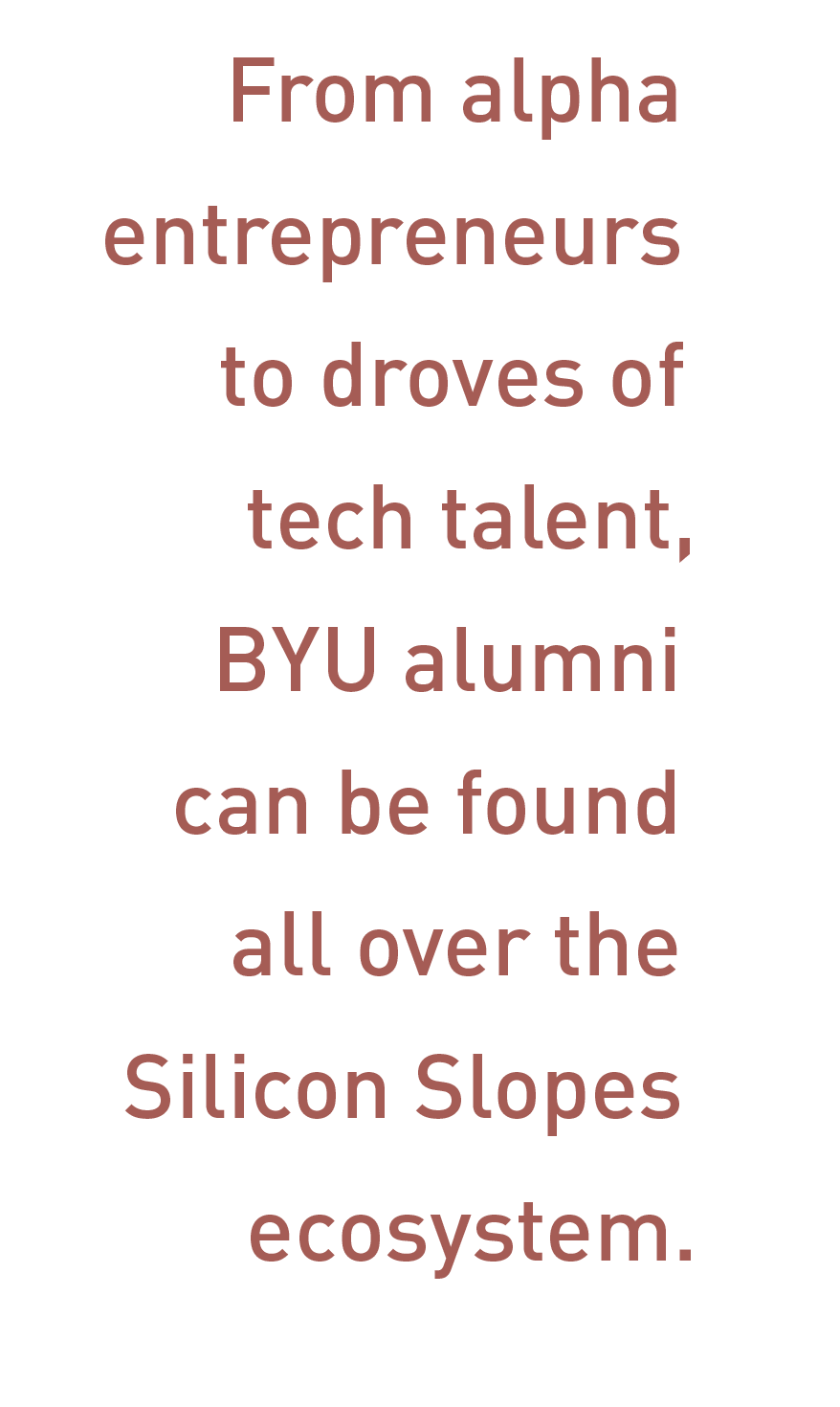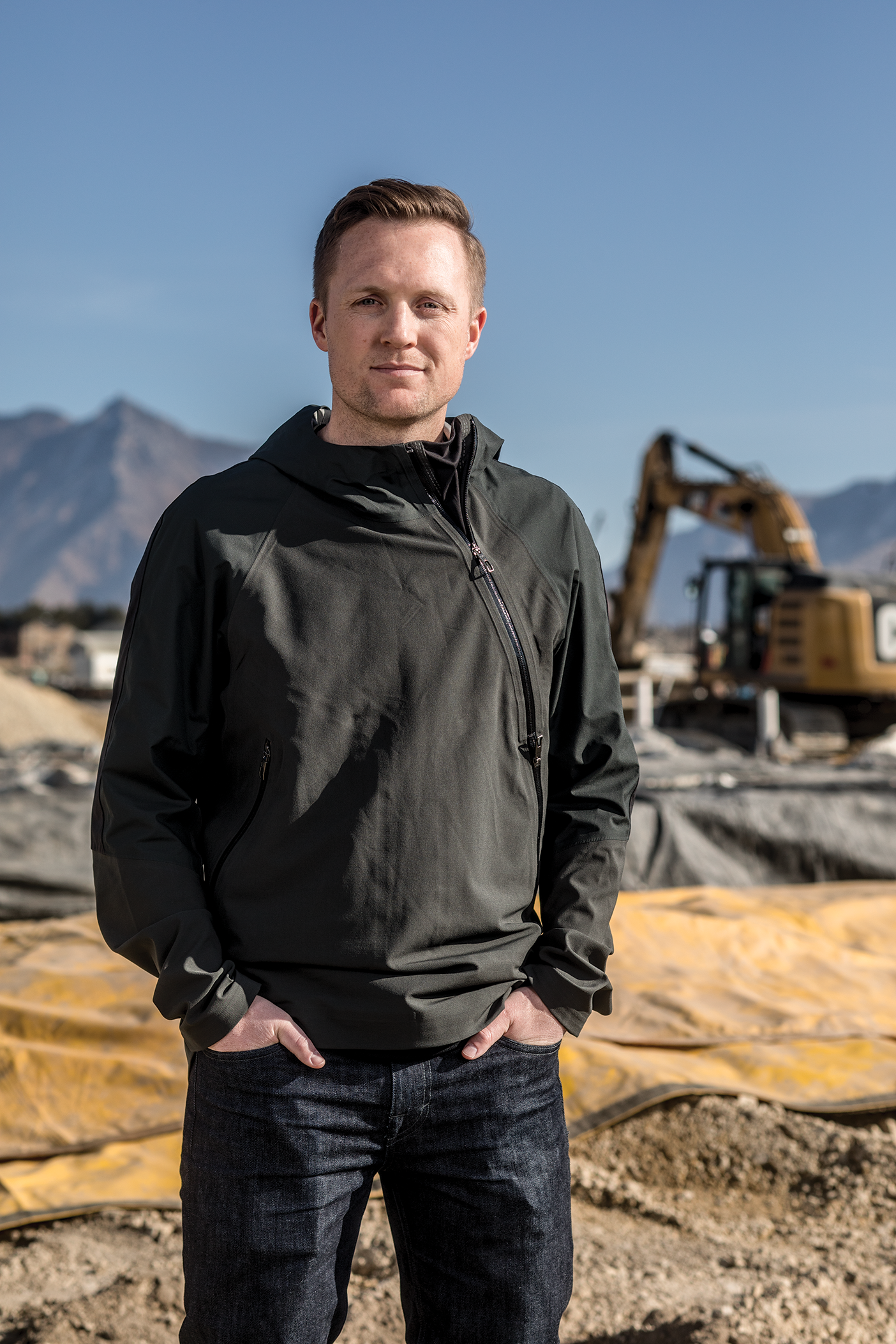Unicorns, Gazelles, and Cougars on the Slopes

From alpha entrepreneurs to droves of tech talent, BYU alumni can be found all over the Silicon Slopes ecosystem.
By Michael R. Walker (BA ’90) in the Winter 2018 Issue
Photography by Bradley Slade
What’s going on in Provo?” asked Shark Tank’s Mark Cuban in 2013 after BYU student Garrett B. Gee (’15) pitched his big idea—a code-scanning app—on the NBC show. Gee was the second of four people with BYU ties to appear on the show that season. Although the sharks didn’t invest, Snapchat took notice, later acquiring Gee’s app for $54 million. Not coincidentally, Snap Inc. recently announced that Utah will be the location for a new facility—just the latest story of tech expansion on the Wasatch Front, from Adobe and eBay to Overstock, Dell, and even the National Security Agency.
What’s going on in Provo is visible up and down northern Utah. If you have driven from the Point of the Mountain down to BYU in the last 20 years, you’ve seen the transformation. The view changes daily as cranes swing steel beams into modern multistory buildings and as rows of restaurants, shops, and hotels, along with homes in countless cul-de-sacs, pop up around them. Once-sleepy towns are now cities, some having more than quadrupled in population over two decades.
No surprise, then, that Business Insider has Utah at the top of its list of fastest growing tech states. And Provo is no. 4 on the Forbes list of the 10 best cities for future job growth.

Utah is teeming with activity. Peer inside the gleaming glass windows of any logo-topped building here, and you are likely to discover a curious collection of corporate creatures—sharks, gazelles, unicorns, and too many Cougars to count—all part of a dynamic, burgeoning tech ecosystem.
Unicorns? In business lingo, unicorns are private companies valued at $1 billion, and Utah has five of them founded or led by BYU-alumni CEOs. Four of these BYU unicorns offer SaaS (software as a service) and are on the Forbes list of hottest cloud companies: Qualtrics (survey solutions), Domo (business analytics), Pluralsight (tech training), and Insidesales (lead tracking). Recently, Traeger Grills, a 30-year-old company with a new tech approach and a BYU business grad CEO, joined Utah’s $1 billion list. And a handful of other BYU-alumni led companies are approaching unicorn status.
If that’s a lot of unicorns, the gazelles—fast-growing, agile start-ups—are everywhere, especially in technology. And an increasing pool of opportunistic investors—sharks—is eager to feed (and feed on) this entrepreneurial frenzy. There are now 4,000 tech companies in Utah, most gathering between Provo and Farmington. Every week there seems to be another business article, from Forbes to Entrepreneur to the New York Times, addressing Cuban’s question, What’s going on in Provo—and, by extension, in Utah? It’s a combination of location, pioneer spirit, low cost of living, business-friendly policies, and a highly educated workforce. And at the center of this start-up spirit is BYU, its faculty and students, and its strong tech, business, and entrepreneurial programs.
Recipe for Success
Two weeks before his first son was born, business student Eric A. Stopper (’18) was sitting in a Tanner Building classroom talking to a classmate. Stopper’s wife, Kamali’i, had endured a difficult pregnancy. “She was sick from the time that we found out till the very end,” he says. Concern for the baby and hospital visits added to the young couple’s daily stress. “You feel powerless as a dad,” says Stopper. “I never wanted that to happen to anybody ever again.”
As Stopper shared his concerns with a classmate, he said, “Wouldn’t it be cool if there was an ultrasound system that you could use on your smart phone?” Overhearing the conversation, another friend, Donald L. Moser II (’18), rushed over. “What are you doing?” Moser exclaimed. “Don’t give that away! That’s a great idea. Submit it to the Big Idea Pitch competition at BYU.” Stopper took Moser’s advice.
After presenting his big idea to a roomful of alumni entrepreneurs, Stopper received the most votes and won $500. “I won it all!” he wrote on Facebook. “I can’t accurately describe the feeling that I got from having a bunch . . . of my career idols come up to me and tell me how interested they are in investing in my idea. Thank you, BYU and your awesome alumni!”

Stopper went on to win every event in the Miller Competition Series, BYU’s sequence of start-up contests that includes the Big Idea Pitch, the Business Model Competition, and the New Venture Challenge. Finalists there, like Stopper, earn a spot in the Founders’ Launchpad, where they receive seed money, office space, and a mentor with real-world experience.
After accumulating $85,000 from contest wins and development funds, Stopper went on to win the statewide competition at the University of Utah. Now working in ground-level space in Provo’s iconic Startup Building, Stopper has evolved his idea beyond ultrasound and is screen-printing nanotech sensors onto light fabrics, testing prototypes, and preparing to launch a wearable kick-counting tracker for expecting mothers.
“All the competition winnings and all the help from BYU have pushed this business to where it is,” he says. Stopper is one of hundreds of students being set up for success by BYU’s entrepreneurial program.
After a dozen Utah County contestants pitched ideas on Shark Tank, investor and host Barbara Corcoran surmised that “there must be a secret sauce in Provo that gives entrepreneurs an extra share of creativity and the energy it takes to build a successful business.” If Corcoran is right, then BYU’s Rollins Center for Entrepreneurship and Technology clearly has been improving the recipe. The Princeton Review’s annual list of entrepreneurship programs has BYU’s undergraduate and graduate entrepreneurship programs ranked no. 3 and no. 6, respectively. In the last five years, BYU students have started 676 companies and raised $1.32 billion in funding.
What’s in the secret sauce is no secret, according to Rollins Center director Scott Petersen. “It’s having bright, sharp students, incredible faculty, and mentors that are committed, giving their time and money, staying with them over the course, and providing early-stage risky capital to these students. Put all that together.”

As Stopper worked to create a fetal monitor, he met mechanical-engineering professor Anton E. Bowden, who pitched in both expertise and eight years of research, greatly accelerating Stopper’s efforts to launch his start-up, which he named Rubi. Such mentors are a key ingredient in BYU student successes, says Petersen. The Rollins Center reports that “90 percent of the entrepreneurship faculty has started, bought, or run a successful business, and 219 individual mentors have worked with students through an officially sponsored school program.”
The center’s focus extends beyond just business students. “Our goal is to educate all of campus about the opportunities that exist in entrepreneurship,” says Petersen. Currently, nearly one in six BYU students takes at least one course in innovation or entrepreneurship. In 2017, Miller Competition Series winners came from management, information technology, computer science, and mechanical engineering, and other finalists came from disciplines like genetics, landscape management, communications, and music.
The center advises students to create teams with diverse talents: most successful company cofounders bring together a combination of business, technical, and lifestyle skill sets. Last fall a cross-campus networking event email encouraged students from a variety of campus colleges to join business teams built in the classic trio of “Hustlers, Hackers, and Hipsters.”
For Stopper and other students who plug into BYU’s successful programs, the Rollins Center provides much more than a giant cardboard check. Stopper credits his mentors with keeping him in school and helping him beyond business: “They’ve also helped me stay solid in the gospel. . . . They helped me stay solid as a dad and as a husband.”
Petersen says such outcomes are ultimately more important than rankings or visibility or even making money. “We’re not interested in building wealth without character,” he says. “We want wonderful fathers, mothers, parents, servants in the community and the Church. If they are just wealthy, without being those, then we have utterly failed.”
Building the Slopes
As the new CEO at Traeger Grills in 2014, Jeremy B. Andrus (BA ’96) faced a 30-year accumulation of what he calls “toxic company culture.” And a big decision. Having led Utah-based audio-device maker Skullcandy, Andrus decided to relocate the Traeger headquarters from Oregon to Salt Lake City. Trusting in Utah’s entrepreneurial advantages, Andrus felt he could move his well-established company there and treat it like a start-up. He improved distribution issues, then helped Traeger into the digital era by introducing a high-tech grill that communicates with a smart phone, growing the company to a billion-dollar success.
“I really admire the spirit of entrepreneurship in Utah,” says Andrus. “This place is filled with really smart people who work hard. They’re honest, they care about what they do, and I felt like this would be a great place to recruit a team and build a great culture.”

Culture, self-reliance, and young skilled workers—along with accessible mountains—are key to Utah’s appeal. Utah tech pioneer Joshua G. James (’96) touted those traits years ago when he coined the term Silicon Slopes, a name that nods to both Utah’s tech prowess and its world-famous skiing.
In a state where venture capital now flows freely, there was once little to no investor interest. Back in 2000, a Silicon Valley venture capitalist was engaged in a promising discussion with James, then CEO of web-analytics firm Omniture. When the potential investor asked where the company was based so he could make a visit, James replied, “Utah.” The investor turned and walked away without another word.
“We weren’t in Silicon Valley,” says Omniture cofounder John R. Pestana (BS ’15). “I mean, PC World Magazine rated us in the top 16 hottest sites on the internet at one point, and we could barely raise money.”
In the 1990s, after meeting in a BYU information-systems classroom, BYU students James and Pestana had begun building websites and analyzing data, which turned into Omniture. In 2009 they sold it for $1.8 billion to Adobe, which then broke ground on a large facility in Lehi. This had a ripple effect in Utah, jump-starting the economy and solidifying the Wasatch Front as a tech hub. Building on that capital and infrastructure and pulling from the talent stream flowing from BYU and Utah’s other universities, Silicon Slopes continued its phenomenal growth.
“It takes this combined effort of everyone in the ecosystem and at every level. Education, government, school, companies, and capital,” says Cydni Rogers Tetro (BS ’96, MBA ’98), a computer-science grad who is now CEO of customer-experience-design company Forge DX and president of the Women’s Tech Council. “Today it’s cool because now we’re sitting at the other side of that, where we can declare that we have built this ecosystem and we’re still focusing on it. Now all that work pays off by the visibility we get across the country.”
And it pays off in jobs and opportunities. Forbes has ranked Utah as the best state for business and careers nearly every year since 2009, and in 2016 the U.S. Chamber of Commerce ranked the state first in innovation and entrepreneurship.
When competing with Silicon Valley’s job-hopping workforce, high housing prices, and long commutes, tech leaders agree that Utah offers advantages for start-ups looking for smart, savvy, and loyal employees.
“Utah has the youngest population in the U.S. and 25 colleges,” says Carine Strom Clark (BA ’87, MBA ’93), CEO of Banyan, a medical-technology company. “We speak 120 languages.” And she points to returned missionaries’ perseverance, confidence, and coping skills, which translate well into sales and other aspects of business. “They’re explorers. . . . They go out and then they bring back these leadership skills,” says Clark. “And we have this really collegial community of executives, a lot of them from BYU.”
What Goes Around
Last spring, in front of a packed Tanner Building classroom, ball-cap-clad CEO Eric W. Rea (BS ’12) was hard to distinguish from the students he had come to mentor. In a lively Q&A about how he created his company, Podium, he tossed out both company swag and his best advice for free. “We were really, really scrappy,” he said. “We did not spend money on anything except for getting customers or building something people wanted by solving a real problem.”
The real problem Podium solved? Well, Rea’s dad owned a tire store. Back when word of mouth generated business, his pop’s shop was doing great. But when online reviews and social media deflated face-to-face references, his dad’s company needed a digital realignment. Eric and his partner, R. Dennis Steele (BA ’12), went to work on a cloud-based way to gather reviews for businesses lacking online traction.

Podium has grown like crazy—600 percent in 2016 alone—expanding from 15 to 200 employees since its 2014 launch. From humble beginnings in a spare Provo bedroom to rented space over a bike shop to a full floor at Thanksgiving Park, Podium keeps outgrowing its space, and it broke ground last fall on a $10 million facility near Lehi, anticipating 400 new employees.
Rea has plenty of work, but he finds time to give back. “Last week I spent two hours in the afternoon on a Friday with this BYU student who’s been graduated for a year, and he’s starting this company,” he says. “It was so cool because we made three big breakthroughs in two hours, and he emailed me that night and he was like, ‘Dude, I’m so thankful.’ It doesn’t cost me much. All it costs is two hours.”
BYU instills grads with both an expectation and a sincere desire to give back to the next generation of learners. “Most people think, ‘I’ll mentor one person,’” says Carine Clark, of Banyan. “No. Mentor 20 people. Use technology to do it. Look for ways to send them messages. You can text them. You can Instagram them. You can post. You can watch their Twitter feed and make sure that they’re doing what they say they’re going to do. Then you can open the door for them.”
In addition to time and energy, grads also put money into the tech ecosystem. Alumni investors—including successful entrepreneurs at Utah’s unicorn and gazelle companies—keep an eye on promising start-ups, and it doesn’t hurt when they launch from their alma mater. “It has been awesome to watch how Utah has changed and to see how many great entrepreneurs live in Utah and are starting businesses,” says Traeger Grills CEO Andrus. “And it’s been fun to do a lot of early-stage investing, especially in Utah County.”
In addition to investing in Utah-based start-ups, the BYU-educated leaders of Silicon Slopes often gather to collaborate and build for the future. “There’s a lot of commitment to BYU because we all went there,” says Aaron B. Skonnard (BS ’96), CEO of Pluralsight, an online tech-training platform. “I would say the thing that we talk about the most when we get together is just how the state is doing and how our collective approach to recruiting people to the state is doing. The shared vision we have for working together is really lifting the Utah brand to this higher ground, which will make it easier for us to attract more tech talent to Utah from outside of Utah.”
Looking for a place to launch a business, BYU grads Nathan J. (BS ’96) and Vanessa Munns Quigley (BM ’96) tried out Los Angeles, Paris, Boston, Connecticut, and Florida before eventually landing in Provo and introducing Chatbooks, a mobile app that creates photo books from digital photos. “We got here, and we just immediately sensed a different kind of energy level, like people really trying to make a tiny dent in the universe in a way that we didn’t feel enough in Florida,” says Nathan. “That was incredibly invigorating for us, just being in Utah. Within weeks we had found a bunch of kindred spirits in the entrepreneurial community and investor community and really quickly found and attracted some talent that’s still with us today.”
Now a thriving, multi-million-dollar success, Chatbooks has extensive connections with BYU and its students and grads, providing mentoring and supporting research.
Cougar Capital, a venture capital and private equity fund run by second-year BYU MBA students, has invested in Chatbooks. Four different BYU student teams have done semester-long studies with the company, looking at marketing, strategy, growth, and investment. Chatbooks has BYU student interns and part-time employees; the company even hired one of the Cougar Capital class members as director of operations.
For many successful alumni who are helping to build Silicon Slopes, continued involvement in BYU is a response to the Marriott School’s emphasis on giving back and a personal commitment. “When I go back now and I speak to entrepreneurs and business-school students, I have a real appreciation for not only their work ethic, their impressive intelligence, and their career aspirations, but also their desire to do good,” says Andrus. “That, to me, is such a great part of what BYU is about.”
Investments in young talent and their big ideas—whether through capital or mentoring or job opportunities—create a virtuous cycle, one that continues to build momentum in businesses all along the Wasatch Front.
Pestana finds great satisfaction in what he’s helped create. “I see a lot of my former employees working at these companies in Utah, and they’re on the management teams. . . . We laid that foundation where we trained people and helped facilitate an environment where they excelled,” he says. “It’s almost like [how] you look at your children and see all the things they accomplish. . . . I sit back and look at all the things that [my friends are] doing now, and it just makes me smile.”
Feedback: Send comments on this article to magazine@byu.edu.



